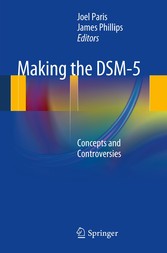Suchen und Finden
Making the DSM-5 - Concepts and Controversies
In 2013, the American Psychiatric Association published the 5th edition of its Diagnostic and Statistical Manual of Mental Disorders (DSM-5). Often referred to as the 'bible' of psychiatry, the manual only classifies mental disorders and does not explain them or guide their treatment. While science should be the basis of any diagnostic system, to date, there is no knowledge on whether most conditions listed in the manual are true diseases. Moreover, in DSM-5 the overall definition of mental disorder is weak, failing to distinguish psychopathology from normality. In spite of all the progress that has been made in neuroscience over the last few decades, the psychiatric community is no closer to understanding the etiology and pathogenesis of mental disorders than it was fifty years ago.
In Making the DSM-5, prominent experts delve into the debate about psychiatric nosology and examine the conceptual and pragmatic issues underlying the new manual. While retracing the historic controversy over DSM, considering the political context and economic impact of the manual, and focusing on what was revised or left unchanged in the new edition, this timely volume addresses the main concerns of the future of psychiatry and questions whether the DSM legacy can truly improve the specialty and advance its goals.
Joel Paris, MD, is Professor and Chair of the Department of Psychiatry at McGill University, and Research Associate in the Department of Psychiatry at Sir Mortimer B. Davis Jewish General Hospital.
James Phillips, MD, is Associate Clinical Professor of Psychiatry at the Yale School of Medicine. He is in the private practice of general and forensic psychiatry. In the Yale department he is involved in residency training, the Hispanic Clinic, and the Global Mental Health Committee. He has a long involvement with the Association for the Advancement of Philosophy and Psychiatry, serving as Secretary and as editor of the Bulletin of AAPP.
Alle Preise verstehen sich inklusive der gesetzlichen MwSt.








